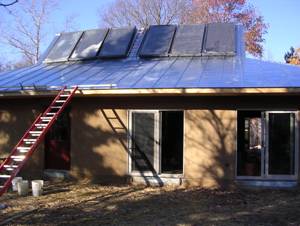LETTERS
More on Strawbale Construction
The January 2006 article in the FPS newsletter on strawbale construction summarized very nicely many of the general principles involved in using that material for building a house. I would like to add just a few additional points that pertain to a strawbale house my wife and I finished building a year ago.
To start with, the opportunity for encouraging community relations should not be underestimated when undertaking a project of this type. On the one hand there is the actual strawbale party one can have to invite neighbors to take part in the building of the house. At least in my experience, there was a tremendous amount of interest among various friends and acquaintances to help out just because it looked like it might be fun. Second, the qualities of the house have provided many opportunities to educate and to learn more about energy efficiency, embodied energy, solar energy and green building practices. It is also important to note that the initial building cost of the house was about $90/sq. ft., less than average for new construction.
An important goal of our house was to have a dwelling that uses less energy than a typical building. After one year of data, the result is that this house uses about 75% less electricity and natural gas than an average house in the Midwest. Although not a zero-net-energy house, the energy bills for the house have been the envy of the neighborhood this winter. While not for everyone, there are many reasons to consider strawbale construction as a reasonably sustainable, environmentally-friendly building technique.


Dr. Robert Brecha
Physics Dept.
University of Dayton
Dayton, OH 45469-2314
Robert.Brecha@notes.udayton.edu
Alternatives to “Global Warming”
In global warming, we do not usually find conclusions being supported by tests, with the standard deviations shown with each test result. And with such a science as global warming, there are many alternant possibilities. We do not often find tests to clearly indicate which of all these alternant explanations are the most viable, along with their individual error analysis.
When I see someone who calls their work scientific, and they have no tests and no error analysis to confirm their position, I do not accept too much of what they have to say. For these many reasons, I support the sentiments of Gordon Freeman as was expressed in a letter in your P&S April issue.
What we can assume is that this earth has previously seen rising and falling temperatures. And there is every reason to assume it is going to occur again no matter what man might do. Looking at the size of this earth, it would be unexpected for us to be able to actual control anything this earth does. For us to try to do this, by spending billions of dollars, by causing us all a lot of pain and suffering, by destroying much of our normal businesses, would very likely all be for nothing.
As Freeman wisely pointed out, what we should do, would be to prepare ourselves to make the most of any change that does occurs. If we have any money at all, let it be to produce better crops that can be grown under warmer conditions. We could use such crops whether global warming occurs or not. Let us find the best way to survive any rising of the oceans. Such studies will be useful no matter what really happens.
This way of responding will be beneficial, no matter what else might happen. Let us maximize the benefits of any efforts we make. We should not try to solve a problem when we do not really know that it is a problem. Why purposely hurt ourselves, just by guessing that it might be helpful.
We do live on an earth where there are yet vast areas that are too cold. Thus, if and when the earth warms up, there has to be as much good done as harm up to the point where there are no more areas that are too cold. We must know what all the options might be, and know the true uncertainties that might exist for each option that is available. I know that we can do better than going around hurting each other. This is not the way to be civilized.
I thank Freeman for his insights. I hope we are able to understand his better approach.
Gerald L. O'Barr
6441 Dennison St.
San Diego, CA 92122
(858)453-0071
globarr@yahoo.com